Jordan - Local Culture
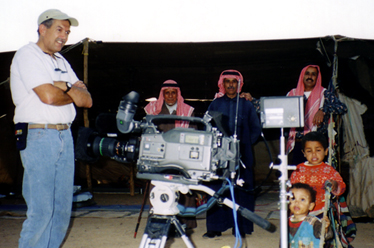
Viewing End of Day Rushes
We always travel with a battery powered color monitor to accurately set up shots in the field. We decided to put it on a light stand and allow our gracious hosts to watch the day's raw footage with us.
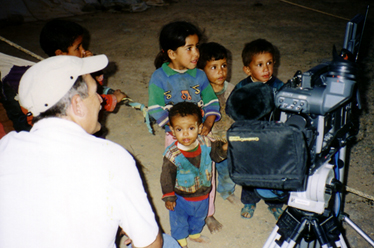
Bedouin Children Captivated by Playback
Although the adults were quite familiar with TV, the young children had never lived with it in their home. Naturally, they were quite amazed by seeing themselves on the color screen.
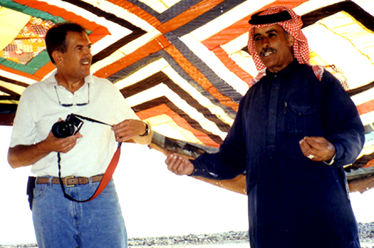
Hospitality Takes Top Priority in Bedouin Tent
If we had any "problem" taping with the Bedouin, it was that they were so concerned for our comfort. For example, it was difficult to convince them we needed to tape them eating the meal, before we could join them. Abu Shayim repeatedly encouraged Patrick to put down his camera and relax with the men over sweet coffee.
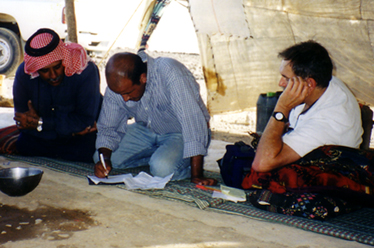
Hard at Work
Even when Patrick did recline on a cushion, he was working on the film, asking Mohammed Al-Oun (center) to write down the names of local herbs we had taped earlier in the day.
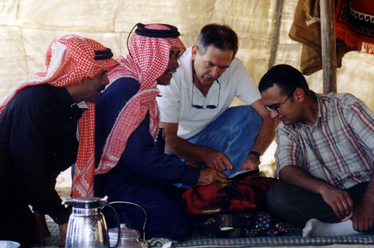
Exchanging Pictures of Home
Jeanne had brought photos of our hometown in New Mexico and the desert around our university. During our break, our local hosts always asked about our city and we found visuals made the translation easier.
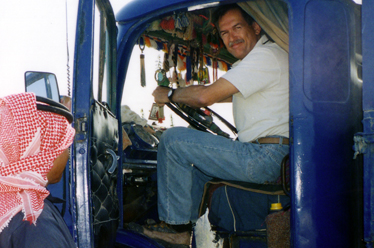
Camels Becoming a Relic of the Past
In the Badia, trucks are quickly replacing camels for transportation. Today's drought requires herders to haul huge amounts of water great distances. Trucks are simply more efficient than camels.
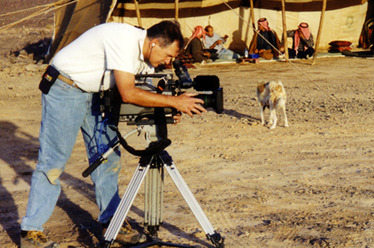
Abu Shayim Hosts Film Crew
Local Bedouin sheep and goat herder Abu Shayim graciously welcomed our documentary film crew into his tent. He even allowed Patrick to enter in the women's side of the tent for taping, an honor rarely afforded to most guests.
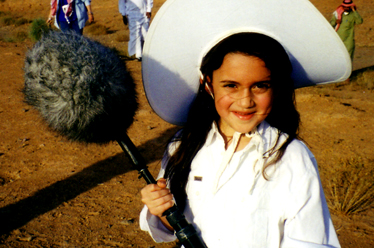
Shariffa Helps with Sound Equipment
Our co-producer in Jordan was Ibtisam Younis. Her daughter, Sharifa (pictured here), often joined us in the field. Ibtisam named her daughter after her boss, Her Highness Sharifa Zein bint Nasser, who was extremely helpful with arrangements for our documentary.
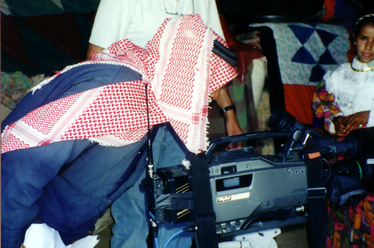
Abu Shayim Watches Video of His Family
Abu Shayim was very interested in our technology and was amused to see footage of his tent home and young children. He has a home in a distant town, but the drought forced him to stay in the Badia for years looking for new pastures, so our visit was an entertaining break.
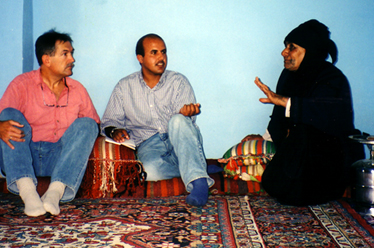
Patrick and Mohammed Al-Oun with Healer Om Owyed
Our local producer in the Badia was Mohammed Al-Oun, head of Extension work for the Bedouin people. He helped us find Om Owyed, a specialist in childhood diseases. Mohammed's reputation as a friendly problem-solver opened many doors for us.
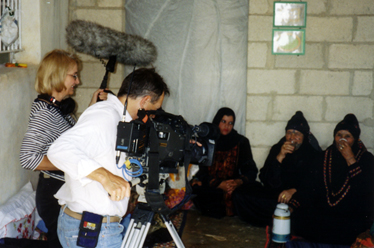
Filming Om Salim
The last healer we visited was Om Salim, a specialist in skin diseases, although she treats most ailments in adults. It is getting so difficult for her to find plants in the Badia; she now grows ten different medicinal plants in her garden.
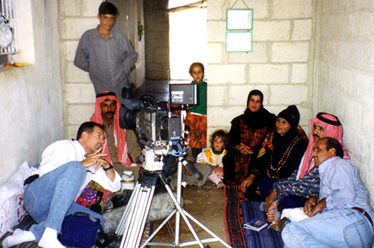
Reviewing Tape with Om Salim
Any time it was practical, we played back at least parts of our tape for our hosts. Although Om Salim's family had many large rooms in their house, this passage way caught the cool afternoon breeze and with comfortable pillows on the floor, it became a favorite lounge area for the family.
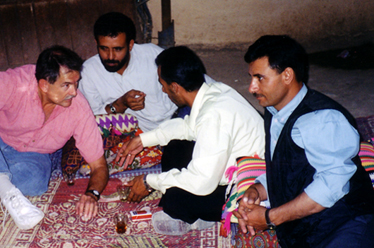
Relaxing with Sweet Tea
In every home and tent we entered, we were first treated to the sweetest, strongest coffee we have ever tasted, followed by small glasses of equally sweet and strong tea. It was during this time the family "sized us up," and we made plans for our taping sessions.
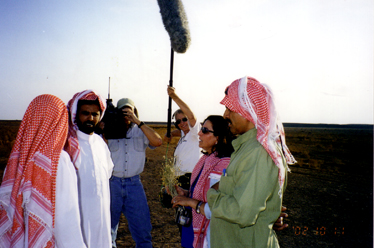
Filming the Beduin People
We went into the field with Dr. Sawson Oran as she gathered wild plants. While there, she quizzed the herders about local uses of the healing herbs. We were thankful for the excellent wind protection for our mic, as the winds seemed to always blow in the Badia.
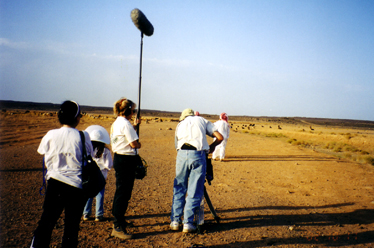
Filming in the Desert
The local Bedouin people were amazingly accommodating as we set up scenes, asking sheep herders to repeat actions several times as we taped from different camera angles. Despite our crazy requests, they remained good natured and helpful.
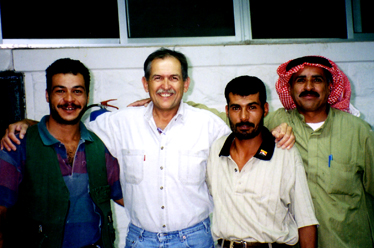
Patrick Holian with Badia Science Center Staff
While in Jordan, we were hosted by the Higher Council for Science & Technology, Badia Research & Development Programme. While taping the Bedouin scenes, we stayed in the Higher Council's remote Science Center in the Badia. The nearest hotel was hours away. Without our friends on the local staff, we could not have completed this documentary.
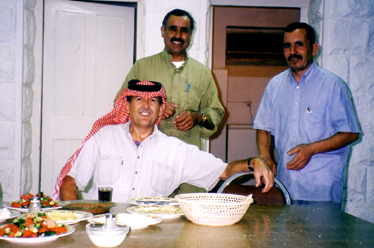
Relaxing After a Meal
During our time at the Higher Council's remote Badia Science Center, we found the staff to be fun loving and full of laughter. One night after dinner, they insisted Patrick wear their local headgear.
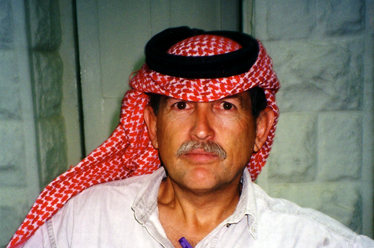
Patrick Finds Local Headgear Very Practical
Although Patrick only wore the local head gear during our after-dinner frolic, we easily understood the utility of this light weight cloth to keep the blistering sun from the neck and head. During the numerous sand storms, the cloth was also used to protect the nose and eyes.
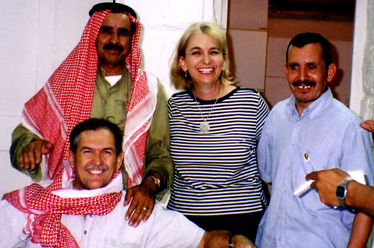
Relaxed with New Friends
Before my first trip to Jordan, I was unsure how a blonde-headed professional working woman wearing pants would be accepted by the Bedouins. I found them to be extremely gracious, kind, and always wanting their picture taken with me.
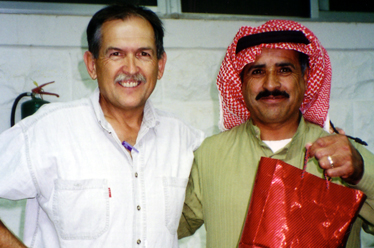
Goodbye Gifts
All too soon, it was time for goodbye gifts. A local peace corp volunteer suggested to Jeanne to bring American chocolate as a gift. After arriving, we were amused to discover she had intended the chocolate as a gift for her, as it was far too bitter for a local sweet tooth. Luckily, near by shops supplied plenty of suitable sweets to supplement the scarves, jewelry, key chains, and caps we had brought as gifts.
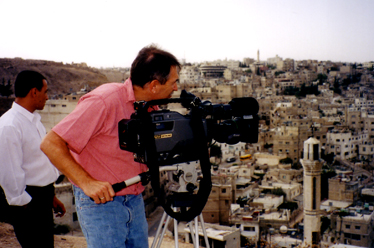
Filming the City of Amman
Amman is a modern city that gleams white at noonday. We found many "filmmaker's dream" high vantage points around Amman to best show of the city and some ancient ruins.
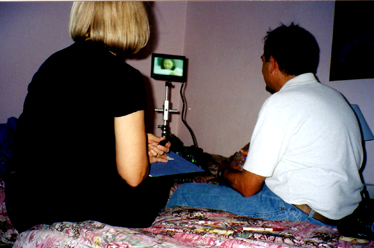
Reviewing the Video
Each night, Patrick and Jeanne reviewed the day's tape and made lists of additional information and shots needed for the tape. We wanted to be sure that the story was "in the can" when we flew home from Jordan - and it was!
For more information about this website.
Contact the webmaster to report any problems with this site.
New Mexico State University is an equal opportunity/affirmative action employer and educator. NMSU and the U.S. Department of Agriculture cooperating.